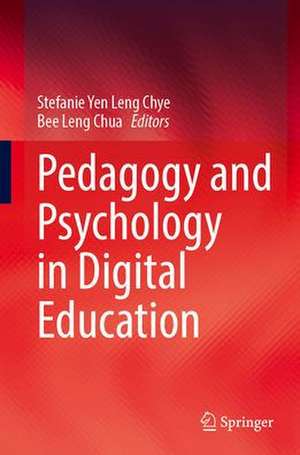Pedagogy and Psychology in Digital Education
Editat de Stefanie Yen Leng Chye, Bee Leng Chuaen Limba Engleză Hardback – 31 iul 2023
Preț: 949.73 lei
Preț vechi: 1158.20 lei
-18% Nou
Puncte Express: 1425
Preț estimativ în valută:
181.75€ • 188.67$ • 151.55£
181.75€ • 188.67$ • 151.55£
Carte tipărită la comandă
Livrare economică 24 martie-07 aprilie
Preluare comenzi: 021 569.72.76
Specificații
ISBN-13: 9789819921065
ISBN-10: 9819921066
Pagini: 195
Ilustrații: XII, 195 p. 33 illus., 17 illus. in color.
Dimensiuni: 155 x 235 mm
Greutate: 0.57 kg
Ediția:1st ed. 2023
Editura: Springer Nature Singapore
Colecția Springer
Locul publicării:Singapore, Singapore
ISBN-10: 9819921066
Pagini: 195
Ilustrații: XII, 195 p. 33 illus., 17 illus. in color.
Dimensiuni: 155 x 235 mm
Greutate: 0.57 kg
Ediția:1st ed. 2023
Editura: Springer Nature Singapore
Colecția Springer
Locul publicării:Singapore, Singapore
Cuprins
Part 1: Digital education for 21st Century learning.- A self-determination theory perspective on online lessons.- Student-centered learning with large student groups: Rationale, organization and experiences in problem-, project- and team-based learning.- Online synchronous peer feedback practice during Covid-19.- Does online coaching support training transfer? Coaches’ perceptions of early-career teachers’ implementation of self-regulation strategies in the context of a professional development programme.- Digital portfolios for problem-based learning: Impact on preservice teachers’ learning strategies.- Formative assessment to support pre-service teachers’ self-regulated learning in digital education.- Part 2: Innovative uses of digital technology in education.- Man-machine partnership to support remote peer tutoring – Psychological, pedagogical and technological considerations for the development of a mobile application.- Supporting knowledge building with digital technologies: From computer-supported collaborative learning to analytics and artificial intelligence.- Using pedagogical principles to design a Mooc for parents and educators.- Teaching social-emotional learning with immersive virtual technology: Exploratory considerations.- Supporting health professions education with virtual simulations: The role of technical, educational and affective factors in assessing opportunities and challenges.- Can social presence promote meaningful learning? Danmaku video learning to enhance social presence and meaningful learning.- Part 3: Challenges in digital education.- The other side of the promise: Some precautions for technology-based education.- Misjudgements of learning in digital environments.- Mediating effect of loneliness on social emotional learning and problematic internet use in Singapore youth.
Notă biografică
Dr. Stefanie Chye is Assistant Dean at the Office of Teacher Education and Assistant Professor at the Psychology and Child & Human Development Academic Group of the National Institute of Education, Nanyang Technological University, Singapore. Her research interests lie at the intersection of educational psychology, innovative pedagogies, and the use of technology in teaching and learning. Stefanie is also Vice-President of the Educational Research Association of Singapore, and is Co-executive Editor of the journal Educational Research for Policy and Practice.
Dr. Bee Leng Chua is currently Associate Dean at the Office of Teacher Education and Senior Lecturer at the Psychology and Child & Human Development Academic Group of the National Institute of Education, Nanyang Technological University, Singapore. She has conducted research in the areas of mediated learning, problem-based learning, e-PBL, motivation, cognition, and teacher education. In addition to her work in the National Institute of Education, she also regularly shares her expertise in subject disciplines such as educational studies and instructional pedagogies with schools and educators from other organizations and countries.
Dr. Bee Leng Chua is currently Associate Dean at the Office of Teacher Education and Senior Lecturer at the Psychology and Child & Human Development Academic Group of the National Institute of Education, Nanyang Technological University, Singapore. She has conducted research in the areas of mediated learning, problem-based learning, e-PBL, motivation, cognition, and teacher education. In addition to her work in the National Institute of Education, she also regularly shares her expertise in subject disciplines such as educational studies and instructional pedagogies with schools and educators from other organizations and countries.
Textul de pe ultima copertă
This book brings together latest research which explores the intersection between educational psychology and educational technology. It consolidates contemporary research on the psychological dimension of technology-based learning, and how new learning technologies can impact learners. More specifically, it provides a better understanding of the affordances of technology-based learning, and how they impact the cognitive and affective processes of learners, facilitate new pedagogical approaches, and transform learning environments. It discusses how technology can be used to develop twenty-first-century competencies such as creativity, critical thinking, problem-solving skills, digital literacy, reflection, and lifelong learning, and explores the pitfalls, challenges and dangers therein.
Caracteristici
Bridges theory and practice of educational psychology foundations
Examines the cognitive and affective processes in learners as they engage in technology-based learning
Contributes to global discussion and discourse between the fields of educational technology and educational psychology
Examines the cognitive and affective processes in learners as they engage in technology-based learning
Contributes to global discussion and discourse between the fields of educational technology and educational psychology
